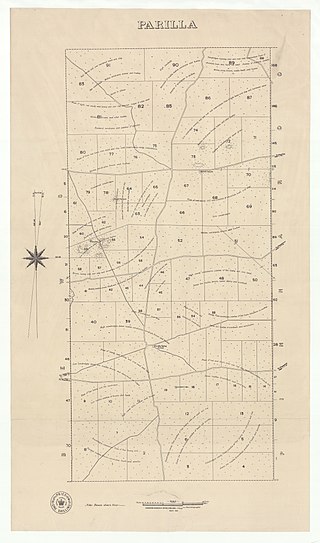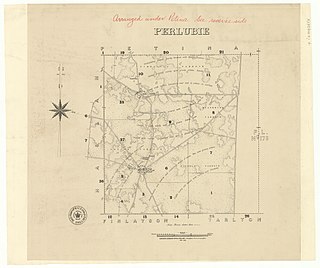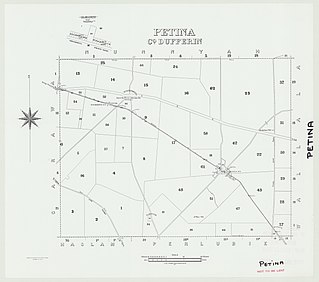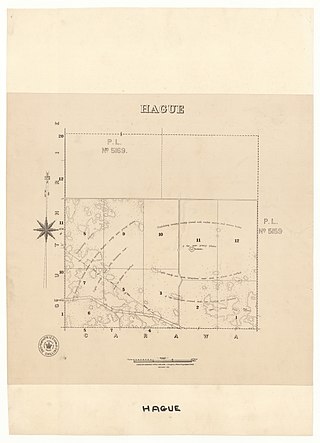
Peeninga is a hundred within the County of Chandos, South Australia established in 1912. [1] [2]

Peeninga is a hundred within the County of Chandos, South Australia established in 1912. [1] [2]
The traditional owners of the land are the Ngargad Australian Aboriginal tribes. [3]

The County of Hindmarsh is one of the 49 cadastral counties of South Australia. It was proclaimed by Governor George Grey in 1842 and named for Governor John Hindmarsh.

County of Fergusson is a cadastral unit located in the Australian state of South Australia which spans Yorke Peninsula south of Price. It was proclaimed in 1869 by Governor Fergusson after whom the county was named.

County of Young is a cadastral unit located in the Australian state of South Australia covers land located in the state’s east on the north side of the Murray River. It was proclaimed in 1860 by Governor MacDonnell and named after his predecessor, Governor Young. It has been partially divided in the following sub-units of hundreds – Markaranka, Parcoola, Pooginook and Stuart.

County of Le Hunte is a cadastral unit located in the Australian state of South Australia that covers land located in the centre of Eyre Peninsula. It was proclaimed in 1908 and named after George Le Hunte who was the Governor of South Australia from July 1903 to February 1909.

The County of Jervois is a cadastral unit in the Australian state of South Australia that covers land on the east coast of the Eyre Peninsula. It was proclaimed on 24 January 1878 and named after William Jervois, the Governor of South Australia from October 1877 to January 1883.

The Hundred of Auld, is a hundred in the County of Chandos, South Australia.
The Hundred of Cotton is a hundred in the County of Chandos, South Australia, established in 1894.

The Hundred of Bews is a hundred in the County of Chandos, South Australia, established in 1894.

The Hundred of Parilla is a hundred within the County of Chandos, South Australia. It was established in 1894.

The Hundred of Perlubie is a hundred within County of Dufferin, South Australia and was proclaimed in 1895.

The Hundred of Petina is a hundred within County of Dufferin, South Australia and was proclaimed in 1893.

The Hundred of Nunnyah is a hundred within County of Dufferin, South Australia. and was founded in 1913.

The Hundred of Hague is a hundred within County of Dufferin, South Australia and was founded in 1913.

The Hundred of Louth is a hundred within County of Flinders, South Australia. It is on the Eyre Peninsula and was proclaimed in 1857.

The Hundred of Stokes is a hundred in the County of Flinders, South Australia. It was proclaimed on 21 November 1878. The name is derived from Francis William Stokes, a member of the South Australian Parliament. Its extent includes the entirety of Cockaleechie in the northwest, part of Ungarra in the northeast, part of Tumby Bay in the southeast and the northern end of Yallunda Flat in the southwest.
The Hundred of Yantanabie is a cadastral unit of hundred within County of Dufferin, South Australia.
The Hundred of Wallala is a cadastral unit of hundred in the County of Dufferin, South Australia.

County of Blachford is a cadastral unit located in the Australian state of South Australia that covers land between the east coast of Lake Torrens and the western side of the Flinders Ranges about 90 kilometres (56 mi) north-east of the city of Port Augusta. It was proclaimed in 1877 and named after Frederic Rogers, 1st Baron Blachford who was the Under Secretary of State for the Colonies from 1860 to 1871. It has been partially divided in the following sub-units of hundreds – Barndioota, Cotabena, Warrakimbo, Wonoka and Woolyana.

County of Herbert is a cadastral unit located in the Australian state of South Australia that covers land to the east of the Flinders Ranges about 55 kilometres (34 mi) north-east of the town of Peterborough. It was proclaimed in 1877 and named after a prominent man of the time with either a title or a surname containing the name ‘Herbert’. It has been partially divided in the following sub-units of hundreds – Cavenagh, Coglin, Minburra, Nackara, Paratoo and Waroonee.

County of Kimberley is a cadastral unit located in the Australian state of South Australia that covers land to the east of the Flinders Ranges about 45 kilometres (28 mi) east of the town of Peterborough. It was proclaimed in 1871 and named after John Wodehouse, 1st Earl of Kimberley, a British Secretary of State for the Colonies. It has been partially divided in the following sub-units of hundreds – Gumbowie, Hardy, Ketchowla, Parnaroo, Terowie and Wonna.